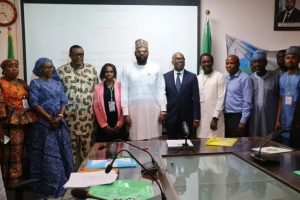Component Lead, Enabling Environment Nigerian Energy Support Programme (NESP), Mr Joshua Yari, says Nigeria has invested €48 million in the second phase of its Energy Support Programme.

Yari said this on Wednesday, April 3, 2024, at a one-day Energy Summit, organised by Energy Commission of Nigeria (ECN) in collaboration with Abloom Trust Nigeria Ltd in Abuja.
The summit was themed: “Prospects of Energy Transition Plan’’.
Yari said that the programme was co-funded by the European Union of the German Federal Ministry for Economic, Corporation and Development.
He said that the Nigerian government would be investing about €19 million in the third phase of the NESP.
“The World Bank with the Nigerian Electrification Programme is bringing in 750 million dollars to support the Nigerian government in terms of integration of renewable energy and energy efficiency, especially in the rural areas’’, he said.
He said the energy transition plan had five focal areas, adding that one of them was to create an enabling environment to support and foster investments within Nigeria.
“This means that one key aspect of improving investments is partnerships between governments, private sector and the international development community.
“This administration has been clamouring for partnerships, especially the inclusion of the private sector in terms of investment.
“We hope to see the private sector come in to play a key role in implementing the focal areas of the Energy Transition Plan,’’ he said.
In his remarks, Director-General, ECN, Dr Mustapha Abdullahi, said collaborating with stakeholders was crucial to achieving goals of energy transition in the country.
Abdullahi said collaboration would provide the avenue for robust discussions, knowledge sharing, and formulation of actionable policy recommendations to guide the country’s energy transition journey.
He said Nigeria must address challenges such as investment barriers, grid integration issues, robust policy frameworks and some hurdles of energy transition goals.
The director-general added that some of the solutions included innovative policy measures, regulatory reforms, and investments in grid modernisation to address the challenges and pave way for a sustainable energy transition.
“It is imperative that we come together to explore opportunities and address these challenges.
“Energy transition is not merely a buzzword. It is a fundamental shift in our approach to energy production and consumption.
“I am confident that your insights and contributions at this summit will inspire us into exploring innovative solutions, sustainable, and resilient energy future for our nation, he said.
Also, Mr Ogbugo Ukoha, Executive-Director, Nigerian Mainstream and Downstream Petroleum Regulatory Authority (NMDPRA), said the impact of the environment was promising as Nigeria migrated from heavy consumption of petrol, and optimising gas utilisation in the country.
“We extend our collaboration and hands of fellowship and look forward to paving a pathway to the development that we are all looking forward to”, he said.
By Jessica Dogo
